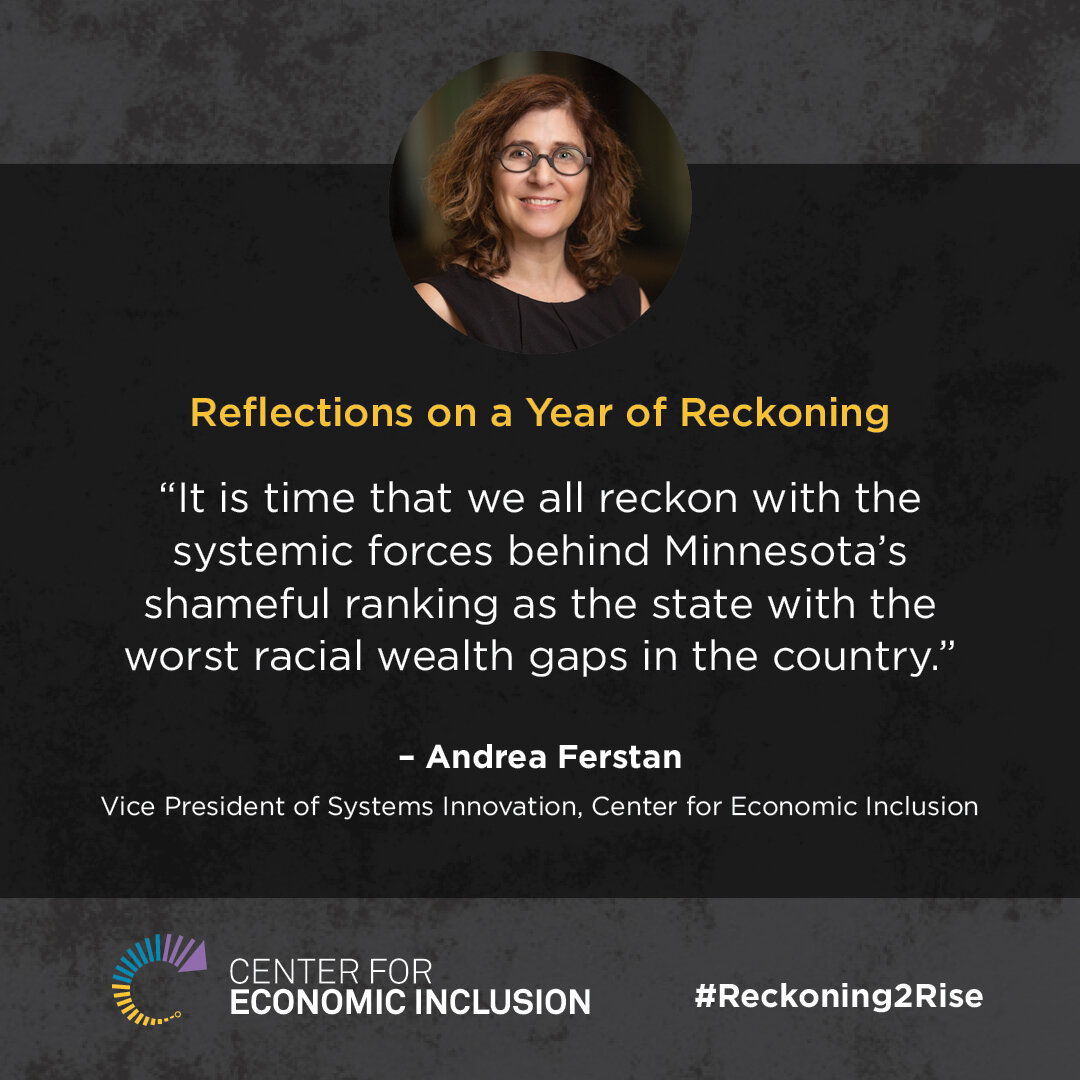By Brett Grant, Andrea Ferstan and Marie Ellis
(This op-ed first appeared in MinnPost.)
Recently, we learned that a significant effort to advance racial equity at the Minnesota Legislature received a serious blow. In a state that has long been defined by its paradox of being progressive yet having some of the worst racial and economic disparities in the nation; in a state that other states across the nation and other countries throughout the world are watching after witnessing the murder of George Floyd; in a state that is about to receive billions of dollars in federal (American Rescue Plan) funding as a result of the pandemic, the Legislature somehow still found a way to de-prioritize the implementation of a working group consisting of legislators and community members to design and propose a method for identifying the racial equity impacts of legislation.
A process to determine equity impacts
A number of partners — including the Center for Economic Inclusion, Blue Cross Blue Shield, Voices for Racial Justice, and the Racial Equity and Joy Coalition — worked tirelessly throughout the 2021 legislative session to ensure that a process for determining the racial equity impacts of legislation would be institutionalized at the Legislature. Our recommendation was to institute racial equity impact notes as a means for ensuring responsive policies and investments based on consistent analysis designed and informed by community and represented in Voices for Racial Justice’s Racial Equity Impact Assessment (REIA). “REIA doesn’t replace economic cost/benefit analysis but strengthens our understanding of policy impacts on the public,” notes Vayong Moua, Director of Health Equity Advocacy at Blue Cross Blue Shield of Minnesota.
A Racial Equity Impact Note is similar to a Fiscal Note and an Environmental Impact Note in that it asks legislators to engage in a process of analysis to determine the impacts of legislation. Ideally, this process would happen as bills are being designed, implemented, and evaluated. Whereas Fiscal Notes focus on the economic impacts of legislation and Environmental Notes examine the environmental impacts of legislation, Racial Equity Impact Notes examine the racial equity impacts of legislation. A unique feature of Racial Equity Impact Notes is that they demand that legislators work in collaboration with communities that are most impacted by racial inequities and disparities in the analysis.
Provision called for a working group
The specific feature of our bill which, until recently, was making its way through House and Senate conference committees, was a provision which called for a working group to be formed consisting of community members and legislators throughout the state that would design a method or framework to analyze the racial equity impacts of legislation within the timeline of the legislative session. The legislative session is fast-paced, with different deadlines for proposing legislation. If deadlines are missed, the risk of not having a proposed bill considered by House and Senate committees is high. A significant challenge of the working group was to figure out a way to conduct a meaningful process of identifying the racial equity impacts of legislation within this timeline.
For example, the Racial Equity Impact Assessment asks five questions: (1) Who is most impacted and how will those communities be engaged in the analysis? This question requires time to build culturally informed engagement and trust in impacted communities. One can imagine how challenging it would be to figure out a process here that would work within the legislative timeline. Question two of the assessment asks what disparity or inequity is being addressed? Question three asks how the proposed policy would change the situation? Question four asks are there potential negative impacts and if so, how would the policy adjust to achieve a racially equitable outcome? And question five asks can the policy be sustainably successful in terms of adequate funding, implementation strategies, and accountability mechanisms? Meaningful answers to these questions depend on the relationships and trust that is built when engaging with impacted communities.
Five questions: only a starting point
“Each question of the racial equity impact assessment begets more questions,” notes Julia Freeman, who is the Director of Community Engagement at Voices for Racial Justice. Julia’s point is insightful in that it recognizes that the five questions of the racial equity impact assessment are only a starting point that lead to more questions, more analysis, and deeper reflections. In other words, the racial equity impact assessment is a tool that welcomes complexity and nuance in the process of determining the racial equity impacts of legislation. Most important, it is a tool that asks for and welcomes collaboration.
We often say that the racial equity impact assessment is a tool that defines racial equity as a process of collaboration. We know this to be true based on our experience using the tool this session with community members and legislators to think about the racial equity implications of the state budget and the thoughtful suggestions and recommendations that emerged from those conversations. It is this process of collaboration that the Legislature rejected.
Why? This is what so many of us are asking. Our bill doesn’t say that all legislation has to have a Racial Equity Impact Note, though that would be ideal. What we proposed is that the Legislature support a working group that would come before the Legislature next session to share our findings and ask for approval of a process designed to assess the racial equity impacts of legislation. If Minnesota truly desires to close the educational opportunity gap and ensure the success of Black, Indigenous, Latinx, Asian Pacific Islander and People of Color (BIPOC) students, the legislation focused on education equity has to go through a racial equity impact assessment. Similarly, all fiscal and budget allocations by the state need to be done with a racial equity lens. This can be done if the Racial Equity Impact Assessment tool is institutionalized at the Legislature.
Commitment needed
We need a commitment from the entire Legislature that racial equity is a top priority. Rejecting the racial equity working group illustrates that too many elected officials do not take racial equity seriously. It is important to work across party lines, but not at the cost of racial equity. Racial equity is a nonpartisan issue. BIPOC communities are literally dying as a result of racial inequities and disparities in Minnesota. It is time that the language of racial equity heard so often at the Capitol translates into a process for achieving it within the lives of Minnesota’s BIPOC communities. We’ve waited far too long for this need and states like Connecticut, Oregon, and Iowa have been doing this since 2008. This is not a feel-good proposal for BIPOC communities. It is a thoughtful process for articulating racial equity in a state where racial inequities and disparities have cost us in so many ways.
+++
Brett Grant is research and policy director for Voices for Racial Justice. Andrea Ferstan is vice president of systems innovation at the Center for Economic Inclusion. Marie Ellis is public policy director at the Minnesota Council of Nonprofits.



























